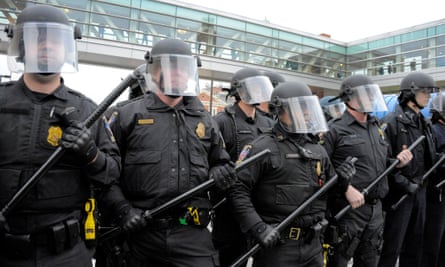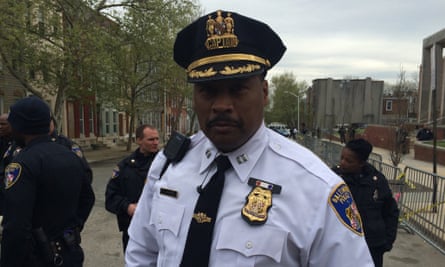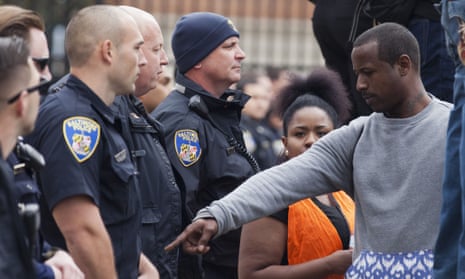A police commander in Baltimore, where protesters clashed with officers this weekend over the death of a young black man, has urged his colleagues to act less like warriors and more like public guardians, in order to help fix a “broken relationship” with residents.
Captain Desmond Carter-Bey said the furious demonstrations over the death of Freddie Gray reflected a distrust of the police in the blighted Maryland city that is so severe, some residents view city officers as an “occupying force”.
“The difference between warriorship and guardianship is a necessity for us to flip the switch,” Carter-Bey, 41, told the Guardian, amid demonstrations outside the headquarters of the police department’s western district, notorious for its depiction in HBO’s The Wire.
Soon after Carter-Bey made his remarks, peaceful demonstrations and marches gave way to skirmishes between protesters and police in riot gear and scattered vandalism.
Police cars and shop windows were smashed outside the Baltimore Orioles’ baseball stadium in the city centre, as the hometown team prepared to face the Boston Red Sox. Thirty-four people were arrested, adding to others detained during smaller protests last week.
Thousands had descended on Baltimore from around the US for the weekend to voice anger about Gray’s death from a broken neck after his arrest on the morning of 12 April. Gray’s family say his spine was left “80% severed” and his voice box was crushed due to something that happened during his detention or transportation in a police wagon.
Gray was chased and arrested after “catching the eye” of a police lieutenant and running away. A knife was found in his pocket. Six officers are suspended while a criminal inquiry is completed. All are said to deny using force against him, but one is invoking his right to remain silent. The US Department of Justice has opened an investigation into whether Gray’s civil rights were violated.
Anthony Batts, the city’s embattled police commissioner, came into office in September 2012 promising to reform the department following a series of cases of brutality. He acknowledged there was “pain in our community” and “a sense of urgency” among protesters demanding justice for Gray.
“We need to change the culture,” Batts told the Guardian, after emerging to speak with demonstrators while a crowd screamed demands for his resignation.

Between megaphone chants from the crowd of “no justice, no peace”, Carter-Bey said he had observed a steady “erosion in understanding” between the police force and residents during his 19 years working at the Baltimore department.
“When you take small chips out of anything, it loses its stability and it loses its structure and it loses its strength,” he said. “We need to try to restore and preserve that relationship.”
Crowds returned to the western district police station late on Saturday night, pelting officers with rocks, glass bottles and eggs. Others yelled insults as police advanced. “You are assaulting American citizens,” a protester calling himself Leon the Poet told them.
“When all hell breaks loose, the difference between a good man and a bad man is how you conduct yourself,” said the 30-year-old, who said he served in the US army in Iraq between 2005 and 2007, stationed at the Camp Anaconda base near Balad.
Carter-Bey had said earlier that in addition to fighting crime, police must tackle “the negativity, and the negative perception, and the broken relationship between the police department and the community”.
“When people believe you are the occupying force, and infiltrating their communities, and not giving them a voice to be heard, they become angry, and instead of us forging a relationship, we become adversaries,” he said.
That was the view of protesters yelling at four dozen officers assembled behind a low metal fence and staring blankly into the middle-distance.
Several African American protesters focused their invective on the 16 black officers among the ranks. “You’re fucking sellout Uncle Toms,” Tya Woodard shouted, along with a stronger racial insult.
“You sold your souls,” shouted Hassan Shabazz, 49, who held a tupperware collection box with a slot in the lid where people could deposit dollars for the New Black Panther Party. “You are thugs for the power elite.”
Woodard said she had moved from Baltimore to Washington out of concern for the future of her four-year-old son, Levi, who stood at her side. “But I can’t forget where I came from,” she said.
Some who remain in the city agreed with Carter-Bey that residents, too, must contribute to efforts to repair their city’s societal bonds.
“The truth is, the blood of Freddie Gray is on the hands of all of us,” said Andre Kennedy.

“The system has failed, the community has failed,” said Kennedy, a self-described “ex-con, ex-crack addict and ex-heroin addict” who estimated he had spent 25 of his 47 years in prison. “We need more nurturing, more loving, more uplifting. It starts with oneself.”
Carter-Bey attempted to at least spark conversation between police and protesters, leaning over the fence dividing officers from the demonstration. “Hello!” he said with a broad smile, on seeing the familiar face of Bill Bleich, of the Progressive Labor Party. “Long time no see!”
“Yeah,” replied Bleich. “When are you going to arrest these officers?”

Comments (…)
Sign in or create your Guardian account to join the discussion